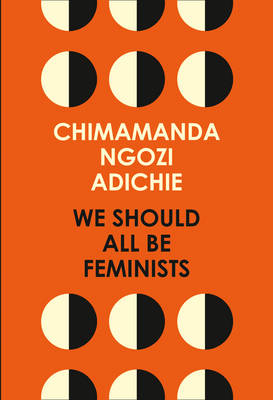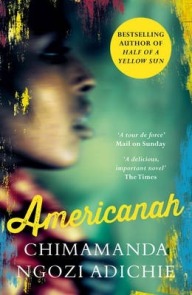As if the Baileys Women’s Prize for Fiction longlist wasn’t enough for you today there is also the release of a new Chimamanda Ngozi Adichie book. No, not the novel that we have all been waiting so desperately for (I mean the royal ‘we’ aka me, you may feel this way too) but another mini book along the lines of We Should All Be Feminists released on International Women’s Day. And a very Happy International Women’s Day to all of the women who read this blog, you are all wonderful and you all need to read this book.
When a couple of years ago a friend of mine from childhood, who’d grown into a brilliant, strong, kind woman, asked me to tell her how to raise her baby girl a feminist, my first thought was that I did not know.
It felt like to huge a task.
And so opens Dear Ijeawele. Thankfully, after some thought, this is not too huge a task for Chimamanda Ngozi Adichie and the results become (slightly tweaked, she admits in the introduction) the text which we read which is a light yet forceful letter to a friend discussing the fifteen ways in which she things she could bring up her daughter, and subsequently her own daughter, to encourage them to be a feminist raising her as one.
Now I am not going to be able to cover everything that Ngozi Adichie does in this book and nor should I because you should all be going out and reading it and buying it for your friends as I will be doing. However I can say that she covers everything from marriage to money, femininity to the politics of gender, and indeed the gender of politics. She covers money, sex, domestic chores, the power of reading, male role models… I could go on and on because in just over sixty pages she covers all this and more. I have no idea how she does it all, but she does. This, slightly ironically, leads me to one of the first points I found particularly interesting.
Please do not think of it as ‘doing it all’. Our culture celebrates the idea of women who are able to ‘do it all’ but does not question the premise of that praise. I have no interest in the debate about women ‘doing it all’ because it is a debate that assumes that care-giving and domestic work are singularly female domains, an idea I strongly reject. Domestic work and care-giving should be gender-neutral, and we should be asking not whether a woman can ‘do it all’ but how best to support parents in their dual duties at work and at home.
What I found particularly fascinating about Dear Ijeawele is how much Chimamanda stripes everything back and not only simplifies things but blows the wind out of the sails of anyone who would want to argue with her. There is no room for debate, no little cracks of questioning to wriggle through, these are her thoughts, these are the simple reasons why it is so and could we all please just see sense, sort it out and move on. Here’s to that.
What also makes the book/letter all the more powerful is that in writing to a friend there is a real warmth to it that seeps into your bones as you read. Not that We Should All Be Feminists is a cold book, far from it, I loved it. Yet it was a blunter angrier teenager in comparison to this wiser, calmer big sister of a book that also knows it can crack the occasional joke, often to make the power behind its humorous intent have a longer and more resonating effect as the undertone is picked up.
There have been recent Nigerian social media debates about women and cooking, about how wives have to cook for husbands. It is funny, in the way that sad things are funny, that we are still talking about cooking as some kind of marriageability test for women.
The knowledge of cooking does not come pre-installed in a vagina. Cooking is learned. Cooking – domestic work in general – is a life skill that both men and women should ideally have. It is also a skill that can elude both men and women.
The final thing that I thought was so brilliant were the constant reminders of how Feminism Lite can be more harmful than simply being a feminist yes or no. Though Chimamanda also, without ever physically writing it, brings up the point of people being Feminist Lite because feminism seems to have become an ugly word. Hmmm, and we all know which parts of society are encouraging that don’t we. I will not bring up the orange monster that shall not be named on this blog ever, but we know the type, we know the contenders. Ngozi Adichie puts it very simply, you are either a full feminist or you are not.
What she also layers on top of this is that feminism is not just about men vs. women, it is also about women vs. women and most importantly what it is really about is one simple, yet as we are seeing seemingly impossible, word… equality, for everyone. Equal culpability, responsibility and sharing of our attitudes, minds and thoughts.
But here is a sad truth: our world is full of men and women who do not like powerful women. We have been so conditioned to think of power as male that a powerful woman is an aberration. And so she is policed. We ask of powerful women – is she humble? Does she smile? Is she grateful enough? Does she have a domestic side? Questions we do not ask of powerful men, which shows that our discomfort is not with power itself, but with women. We judge powerful women more harshly than we judge powerful men. And Feminism Lite enables this.
I am a huge fan of this book as I was its sibling/predecessor. What I love about Chimamanda Ngozi Adichie is that she so eloquently and calmly takes you through it all and makes you feel, once again, like you are having a conversation with her. All in all the perfect book not only for International Women’s Day 2017 but for every day and for everyone.
I heartily recommend you get yourself a copy, which you can do here. Who else has read Dear Ijeawele or indeed We Should All Be Feminists? What other feminist texts would you recommend everyone be reading before the next International Women’s Day? I would love more titles to go off and look for as I am sure would everyone else popping by.




















 You see with the book group I first joined (that in my own head I call ‘the lovely ladies of Levenshulme book group’ because it is lots of lovely women and me and
You see with the book group I first joined (that in my own head I call ‘the lovely ladies of Levenshulme book group’ because it is lots of lovely women and me and  The next book group I joined in part because it was organised by one of my lovely
The next book group I joined in part because it was organised by one of my lovely  Fate seemed to extend a hand when I found a new book group in Manchester through twitter completely randomly. I think Waterstones Deansgate retweeted them, they are the
Fate seemed to extend a hand when I found a new book group in Manchester through twitter completely randomly. I think Waterstones Deansgate retweeted them, they are the  With her debut novel ‘Purple Hibiscus’ Chimamanda Ngozi Adichie takes us into the heart of a family in Nigeria not long after its colonisation, though this not the focus that the book takes, though it’s always bubbling away in the background. Instead Adichie tells us a story of religion as we follow Kambili a fifteen year old girl whose father is an extremist catholic. As the book opens Kambili witnesses her brother Jaja’s defiance of her father as he refuses to take communion in church, something utterly unthinkable, enraging her father and changing the dynamics of the house hold forever.
With her debut novel ‘Purple Hibiscus’ Chimamanda Ngozi Adichie takes us into the heart of a family in Nigeria not long after its colonisation, though this not the focus that the book takes, though it’s always bubbling away in the background. Instead Adichie tells us a story of religion as we follow Kambili a fifteen year old girl whose father is an extremist catholic. As the book opens Kambili witnesses her brother Jaja’s defiance of her father as he refuses to take communion in church, something utterly unthinkable, enraging her father and changing the dynamics of the house hold forever.





